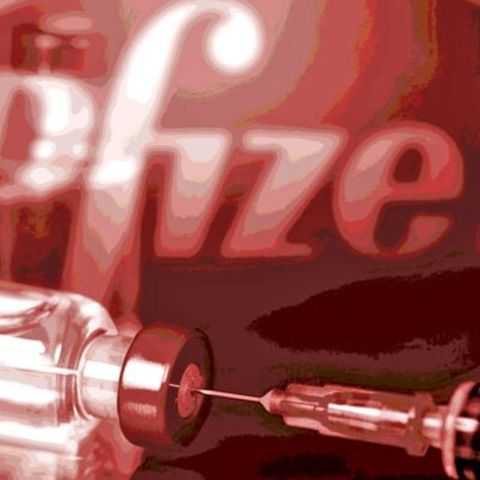It took months to analyze Covid-19, develop vaccine candidates, test them, produce them, and start distributing them to the masses. Steps were skipped or curtailed, of course, as Big Pharma companies raced to cash in on billions of dollars worth of jabs.As Pfizer executive Janine Small said to the EU Parliament last month, they were "moving at the speed of science."But after the huge rush to put out products exemplified corporate fiscal "science" at its worst in 2020, the last two years have seen real science grind to a halt. Producing the jabs happened in record time but analyzing the adverse reactions, reporting on studies, revealing the true lack of efficacy, and investigating deaths are moving slower than molasses. This is by design.The perfect example of this is the sad story of Joseph McGinty, a 14-year-old boy who died three weeks after getting his jabs. It has been nearly 15-months since he died and they're just now getting around to launching an investigation into what killed him. What's worse is they're saying the investigation may take years before they have results. If the jabs are as dangerous as many of us believe (hint: they are), the verdict from this medical investigation will only come out after it's way too late for the masses.Below is an article by Suzanne Burdick, Ph.D., from The Defender, that I discussed on today’s episode.Teen’s Death 3 Weeks After Pfizer Vaccine Triggers InvestigationThe death last year of a 14-year-old Irish teen three weeks after he received Pfizer’s COVID-19 vaccine has sparked a “considerable investigation” that will include requests to Pfizer for safety information, officials involved in an inquest into the teen’s death said this week.The death last year of a 14-year-old Irish teen three weeks after he received Pfizer’s COVID-19 vaccine has sparked an investigation that could take years, officials involved in an inquest into the teen’s death said this week.As part of the “considerable investigation,” authorities said they will request safety information about the vaccine from Pfizer.Joseph McGinty, a secondary school student from Achill Island, Ireland, received the Pfizer vaccine on Aug. 20, 2021. On Sept. 1, 2021, he was hospitalized overnight at Mayo University Hospital and discharged the following day.On Sept. 8, 2021, McGinty revisited the hospital for review. He died at home on Sept. 13, 2021. Patricia McGinty formally identified her son’s remains on the day of his death but “has very little recollection of the morning in question,” the family’s attorney, Rita Kilroy, told the court.The coroner involved in the case, Pat O’Connor, called McGinty’s death “a matter of significant public concern.”“The circumstances of Joseph McGinty’s death is that COVID vaccination was administered to him [and] that there appears to have been either a reaction or a significant change in his medical circumstances following the administration of the vaccine and that subsequently, unfortunately, Master McGinty died,” O’Connor said in Monday’s hearing.Kilroy told the court this week, “We would perceive there to be a concern for public health and safety and potential for recurrence in two circumstances.”An inquest is a formal investigation conducted by a coroner in order to determine how someone died. The purpose of an inquest is limited to establishing the identity of the deceased individual as well as where, when and how they died.At the request of Kilroy, O’Connor agreed to make a request for legal aid and legal advice for the McGinty family under Section 60 of the Coroners Act, 1962.The inquest into McGinty’s death will resume on Dec. 20.Studies link COVID-19 vaccines, including Pfizer’s, to negative health outcomes — especially among young men — including death. In June 2021, The Defender reported on the death of 13-year-old Jacob Clynick just three days after he received the second dose of Pfizer’s COVID-19 vaccine. The Centers for Disease Control and Prevention declined to investigate Clynick’s death, even though the death was reported to the agency’s Vaccine Adverse Event Reporting System (VAERS).Between Dec. 14, 2020, and Nov. 11, 2022, there have been nine deaths reported to VAERS following COVID-19 vaccines among children ages 6 months to 5 years, 31 deaths reported among children 5 to 12 years old and 133 deaths among teens 12 to 18 years old.Last month, Florida Surgeon General Joseph Ladapo, M.D., Ph.D., recommended against mRNA COVID-19 vaccination of males ages 18 to 39 years given the results of a study that found an 84% increase in the risk of cardiac death among young adult males within 28 days of mRNA COVID-19 vaccination. Since March, Florida has recommended against mRNA COVID-19 vaccination of healthy children and adolescents younger than 18.On Sept. 30, Sweden announced it would no longer recommend COVID-19 vaccination for children ages 12 to 17 and in Denmark, COVID-19 vaccines are not recommended for anyone under 50 years old.This article was originally published by The Defender — Children’s Health Defense’s News & Views Website under Creative Commons license CC BY-NC-ND 4.0. Please consider subscribing to The Defender or donating to Children’s Health Defense. This is a public episode. If you would like to discuss this with other subscribers or get access to bonus episodes, visit endmedicaltyranny.substack.com
show less

